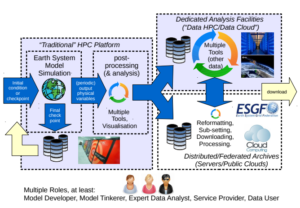In this bimonthly feature, HPCwire highlights newly published research in the high-performance computing community and related domains. From parallel programming to exascale to quantum computing, the details are here.
 Beating data bottlenecks in weather and climate science
Beating data bottlenecks in weather and climate science
Weather and climate simulations produce massive amounts of data, challenging the I/O capabilities of the systems on which they run. A team from the National Center for Atmospheric Science, the University of Reading and STFC Rutherford Appleton Laboratory asks the pertinent question: “Do we really need all that data?” In their paper, the researchers address the data bottlenecks issue by introducing two approaches: dedicated data analysis platforms and smarter storage software. The authors explain the benefits of their approaches, and stress that education, compression and more are still necessary.
Authors: Bryan N. Lawrence, Julian M. Kunkel, Jonathan Churchill, Neil Massey, Philip Kershaw and Matt Pritchard.
Challenging the need for substantial double-precision support in hardware
Conventional wisdom, these authors write, says that HPC applications require large amounts of double-precision support in hardware. This paper, from a team at the Tokyo Institute of Technology, challenges that assumption by “exhaustively comparing a large number of HPC proxy applications on two processors” that deviate from one another in one important regard: the silicon area they devote to double-precision functions. The authors find that the conventional wisdom might not always be correct.
Authors: Jens Domke, Kazuaki Matsumura, Mohamed Wahib, Haoyu Zhang, Keita Yashima, Toshiki Tsuchikawa, Yohei Tsuji, Artur Podobas and Satoshi Matsuoka.
 Developing efficient ray casting-based visualization on heterogeneous HPC architectures
Developing efficient ray casting-based visualization on heterogeneous HPC architectures
“Visualization,” writes Tim Biedert of the University of Kaiserslautern, “is vital to the scientific discovery process.” In his dissertation, Biedert faces the difficulties in efficiently mapping visualization tasks on HPC systems with heterogeneous architectures. He introduces a direct ray tracing scheme for on-the-fly particle simulations that produces reductions in storage requirements while retaining flexibility.
Author: Tim Biedert
Advancing cancer research with large-scale HPC
Many challenges remain in building machine learning models for cancer-related issues. The authors of this paper – a team from a variety of national laboratories and cancer research centers – review the National Cancer Institute (NCI) -Department of Energy (DOE) collaboration, Joint Design of Advanced Computing Solutions for Cancer (JDACS4C). They discuss the multi-institution collaborative effort, which aims to advance cancer research on the molecular, cellular and population levels through advanced computing and data technologies.
Authors: Tanmoy Bhattacharya, Thomas Brettin, James H. Doroshow, Yvonne A. Evrard, Emily J. Greenspan, Amy L. Gryshuk, Thuc T. Hoang, Carolyn B. Lauzon, Dwight Nissley, Lynne Penberthy, Eric Stahlberg, Rick Stevens, Fred Streitz, Georgia Tourassi, Fangfang Xia and George Zaki.
 Using HPC for visual simulations and rendering in Taiwan
Using HPC for visual simulations and rendering in Taiwan
Computer-generated animation for films can take up to seven years to complete. This paper, written by Jasmine Wu and Chia-Chen Kuo, outlines the render farm built at the National Center for High-Performance Computing at National Applied Research Laboratories of Taiwan with the goal of improving the film industry in Taiwan. The farm, which allows users to access rendering resources remotely, is GPU-based and renders “about 10 times faster than a CPU render farm.”
Authors: Jasmine Wu and Chia-Chen Kuo
Conducting simulation-as-a-service with serverless computing
Simulation-as-a-service offerings, which rely on virtual machines or container-based deployments, offer a more flexible alternative to on-premises HPC for many use cases. These authors – a team from the Foundation for Research and Technology Hellas and AI Investments – propose a novel simulation-as-a-service architecture that “exploits the serverless computing paradigm” to reduce the simulation cost based on actual usage of resources while accelerating the simulation time through parallelization.
Authors: Kyriakos Kritikos and Pawel Skrzypek
Studying space radiation’s effects on space missions using HPC
Manned and unmanned space missions are threatened by deep space radiation, which can disrupt electronics and affect astronaut health; however, the only manned missions with dosimetry data beyond low earth orbit are the Apollo missions. This paper, written by Matthew Lund and Tatjana Jevremovic, introduces a new, HPC-based simulation model and application that reduce computational time from weeks to hours when simulating deep space radiation.
Authors: Matthew Lund and Tatjana Jevremovic
Do you know about research that should be included in next month’s list? If so, send us an email at [email protected]. We look forward to hearing from you.





























































